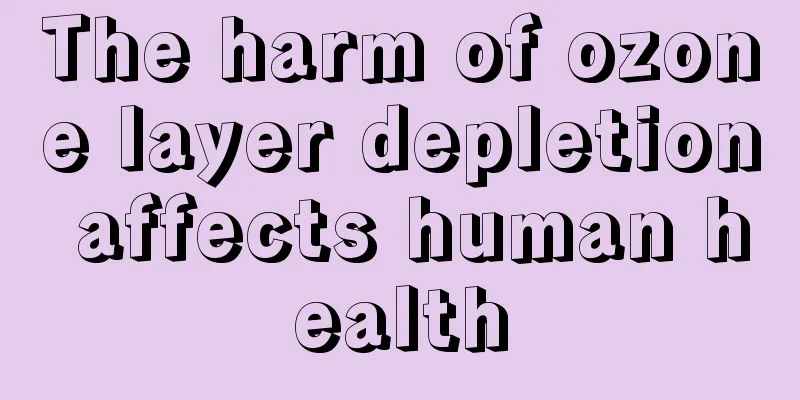The harm of ozone layer depletion affects human health

|
The main function of the ozone layer is to absorb the sun's ultraviolet rays, protecting humans, animals and plants from harm by these ultraviolet rays. However, if the ozone layer is destroyed, human health will be greatly threatened, and crop production and many ecosystems will be affected. 1. It will affect human health. After the ozone layer is destroyed, its ability to absorb ultraviolet rays is greatly reduced, which greatly increases the chance of humans being exposed to excessive ultraviolet radiation. On the one hand, excessive ultraviolet radiation can damage the human immune system, causing autoimmune system disorders and a significant increase in the number of people suffering from respiratory infectious diseases. On the other hand, excessive ultraviolet radiation can increase the incidence of skin cancer. According to statistics, approximately 100,000 people die from skin cancer each year worldwide, and most cases are related to excessive ultraviolet radiation. For every 1% depletion of ozone in the ozone layer, the incidence of skin cancer increases by 2%. In addition, excessive ultraviolet radiation can also induce various eye diseases, such as cataracts, corneal tumors, etc. 2. It will affect the production of crops. Experiments have shown that excessive ultraviolet radiation can make plant leaves smaller, reducing the area for photosynthesis, thereby affecting crop yields. At the same time, excessive ultraviolet radiation can also affect the quality of some crop seeds, making crops more vulnerable to damage from weeds and pests and diseases. A preliminary study on soybeans showed that if the thickness of the ozone layer decreases by 25%, soybean production will decrease by 20%-25%. 3. It will affect aquatic ecosystems. The results of the study show that the increase in ultraviolet radiation will directly cause damage to phytoplankton, zooplankton, larval fish and the entire aquatic food chain. It can be seen that the increase in ultraviolet radiation has a great impact on aquatic ecosystems. After the ozone layer is destroyed, its ability to absorb ultraviolet radiation is weakened, which will bring many adverse effects to human health. Increased ultraviolet radiation will increase the number of people suffering from respiratory infectious diseases, increase the incidence of skin cancer and cataracts, and promote skin aging and disease. Ozone depletion has uncertain effects on plants, such as smaller leaves and greater susceptibility to damage by weeds, pests and diseases. The increase in ultraviolet rays will also intensify smog in cities, accelerate the aging of organic materials such as rubber and plastic, and cause paint to fade. This destructive effect is more serious in tropical regions with high temperatures and abundant sunshine. |
<<: What are the symptoms of hereditary diabetes insipidus
>>: The effects of ozone, these functions are most beneficial
Recommend
What is the knowledge about hair care and treatment
A head of black and beautiful hair is very import...
What are the uses of plain glasses
With the emergence of various eye problems, glass...
Is there any reaction to lumbar disc herniation on cloudy days?
Everyone knows that people with rheumatic disease...
Introduction to the diet menu for nasopharyngeal carcinoma patients
Nasopharyngeal carcinoma is a common disease. The...
How to eat New Zealand pumpkin
I've had all kinds of pumpkins, from small to...
I feel a sore throat when I have chickenpox, please pay attention to these
Chickenpox is a very common skin disease. Once it...
What are the common sites of prostate cancer
Nowadays, people's pace is accelerating, and ...
What are the early symptoms of liver cancer? What is the best treatment for liver cancer?
Liver cancer has become a common disease, and it ...
What is endometrial cancer? It is a skin lesion
Endometrial cancer is a disease that mainly occur...
Why does it hurt and there is blood when I pee?
Painful urination with blood is a common men'...
Summer eye protection: How to choose the color of sunglasses lenses
In the hot summer, many people wear sunglasses. S...
Physical characteristics that shorten your lifespan
If you want to live a healthy and long life, don&...
Will my father's prostate cancer be inherited?
Prostate cancer is a common male disease. Patient...
How to eat Cordyceps sinensis
Cordyceps sinensis has a very important effect. E...
What are the symptoms of vitamin D deficiency rickets
If rickets occurs in the body, it is usually caus...









